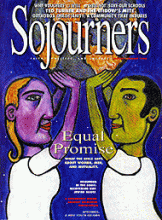One of the most instructive but little-known stories in the search for racial healing is the intriguing relationship between two of the most significant American Christians of the 20th century. Two years after the Montgomery bus boycott began, Billy Graham invited Martin Luther King Jr. to deliver a prayer at his 1957 crusade in New York City. It was an amazing step for a white Southern preacher with a growing national reputation who already was being criticized for taking racial integration too far.
The two held three private strategy meetings in the months afterward. King began to look at Graham's crusades as a model for his mass meetings and dreamed about joint crusades that would convert racially mixed audiences first in the North and ultimately in the Deep South.
Imagine the power of a King-Graham alliance: Two southernersone America's great apostle of justice, the other, our great apostle of evangelism, together in the pulpit. Graham cutting the air with a challenge, calling for the heart change, "You must be born again!"; King's voice resounding, calling for the proof: the "descendants of former slaves and slave-holders sitting at the table of fellowship together."
But King and Graham broke ranks over a tension that continues to plague our attempts at becoming one body. In his history of the civil rights movement, Parting the Waters, Taylor Branch writes:
Read the Full Article
